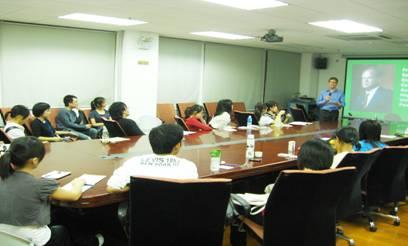Positive Psychology is a rapidly growing field of university teaching and research. It investigates the positive human emotions such as happiness, optimism, appreciation and gratitude as well as flow and meaningful purpose in life. Also of key interest is cultivating character strengths and human flourishing for individuals, groups, communities and organizations. In 1998, the then President of the American Psychological Association, Professor Seligman, launched the field to balance the traditional focus of psychology on the negative human emotion and mental illness.
Positive Psychology is alive and well at Shenzhen University. Dr Mark Williams and Dr Chuck Kieffer, professors in the Foreign Languages Institute, launched Positive Psychology in November 2008 with a series of public talks and began the SZU Positive Psychology Research Group (with a current website at www.aappi.net). They teach Positive Psychology, and Psychology for Success open elective courses in every semester. In China, Positive Psychology is beginning to develop with a newly established Positive Psychology Laboratory at Hong Kong University with Prof. Samuel Ho as the Director.
Positive Psychology is thus a new branch of psychology which focuses on the scientific study of such things as positive emotions, strengths-based character, and healthy institutions. Evidence based research has demonstrated that it is possible to be happier to feel more satisfied, to be more engaged with life, find more meaning, have higher hopes, and probably even laugh and smile more, regardless of one s circumstances. Positive psychology interventions can also lastingly decrease depression symptoms. The website of the University of Pennsylvania Positive Psychology Centre (www.authentichappiness.sas.upenn.edu) allows you to do free psychological tests to determine qualities such as your levels of happiness, optimism and your personal strengths.






